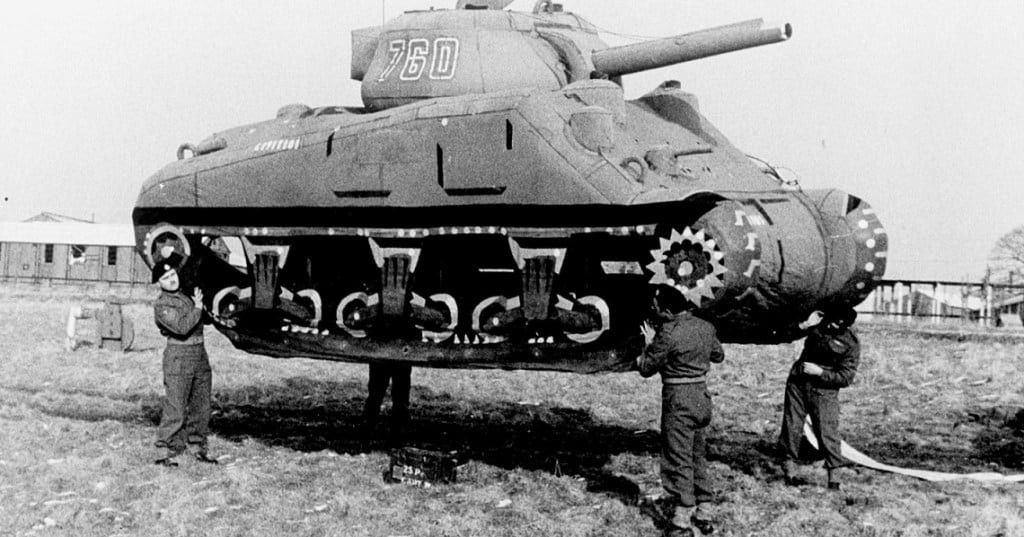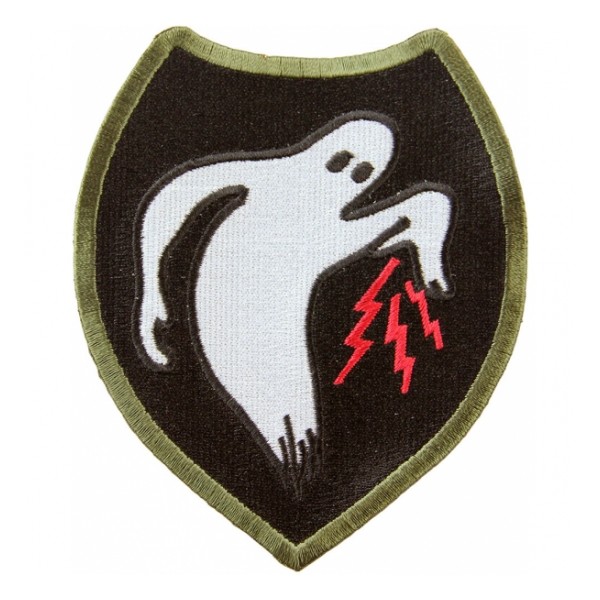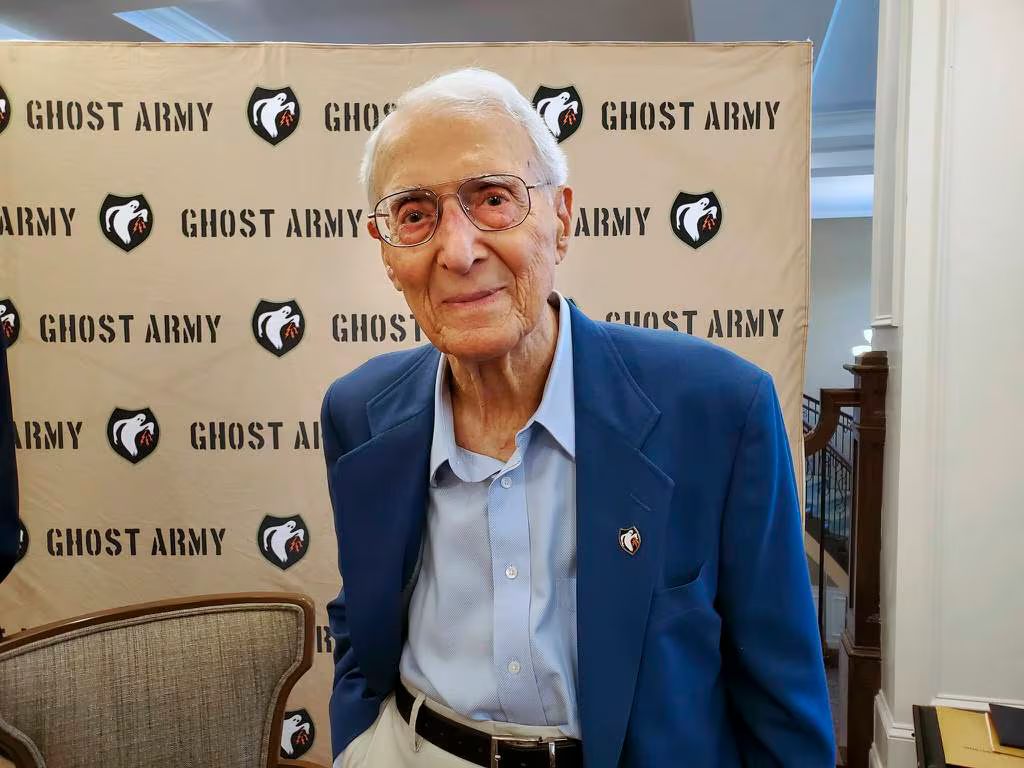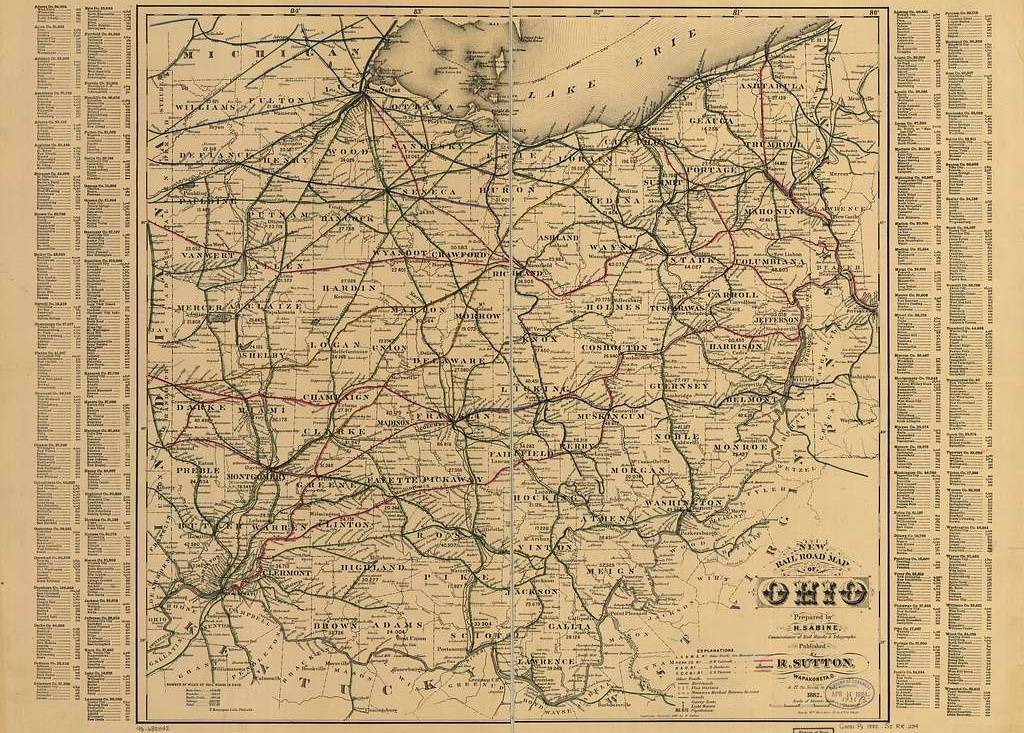George Robert Dramis was born in 1924 in Ashtabula, Ohio, which is where he spent most of his life. When he was eighteen years-old, just after graduating from Ashtabula High School in 1942 (where he was best known as an athlete and standing six foot one, weighing one hundred and ninety pounds, he was quite the powerhouse center on the basketball team) he was enlisted in the Army. It was while he was stationed in Tennessee that he met Shirley Elizabeth Johnson, who would go on to be his wife.
George would go on to become one of the officers of the 23rd Headquarters Special Troops, an elite group of officers whose job description would be shrouded in mystery for decades to come, partly, maybe, because it sounds more like a theater troupe than combat soldiers (although to be fair, they really were both.)
The 23rd Headquarters Special Troops is also known as “The Ghost Army”, not because of any supernatural phenomena or psychic abilities, but because everything about them screamed deception – their job was often to make army troops appear out of nowhere, or to make a small group appear to be a massive movement with hundreds of soldiers. This was the kind of thing they did – and they were damned good at it.
The Ghost Army
It has only been until recently that the existence of The Ghost Army (23rd Headquarters Special Troops) was allowed to be known to the general public. Because the nature of what they did required absolute secrecy, and what they pulled off was textbook deception, that may have been for the best because the United States Army just might have needed to use those tactics again.
So, what kind of things were they doing? Well, let’s look at a few examples.
Let’s say you have an Army Troop at location A. In the middle of the night, you want to move the troop to Location B, but you want the enemy to think that they’re still at location A. The problem is that the enemy is flying planes over your troops to get visual confirmation of their whereabouts, so if you move the troop, the enemy is going to know during their next flyover, which is what you don’t want.
Enter The Ghost Army. They’re going to arrive at night and tell Troop A that it’s time to move on to Location B and once they’re on their way, they get to work. What they do is blow up some inflatable rubber tanks (yeah, blowing up tanks usually means something else entirely) and they’re going erect some low-budget tents, and just maybe they’ll grab a speaker and broadcast the kind of sounds the troop would be making (people talking, perhaps the sounds of a mess hall, that sort of thing), maybe put some lights down to simulate a runway, things like that. Now, when the enemy flies overhead, they are going to think they’re seeing Troop A still at the same place when they’re actually pretty far away, and what they’re actually seeing is just a few, specially trained soldiers putting on a show.

You want another real world example? Ok, here ya go.
Let’s say that the Army has a small troop of men at Location A, which is good because that is where they’re supposed to be. The problem is that there are enemy forces creeping toward Location A and you want to scare them off. You know that the small troop is no match for their forces, and there’s nothing Troop A can do to scare away the enemy fighters. That’s where The Ghost Army comes in. They’ve got this really nifty high powered stereo-speaker system and a bunch of recordings that can make this small troop sound like a massive, well fortified base. They line the perimeter with not only those speakers, but also perhaps some fake vehicles, fake tanks, maybe fill those tents with mannequins so that it really does appear to be people inside them (and they may send one or two of their guys into a tent to move around a bit to make it look more real). Chances are, the enemy is going to be scared away after just hearing that they’re approaching what sounds like a massive base, but if they get close enough to see anything, they’re going to know it’s a massive group of soldiers (when it’s actually just a small troop plus a few extra men).
One more? Ok.
So, it’s World War II and radio is the main way to communicate. You want to broadcast a message to your people, but radio being radio that also means that anyone tuned to the right frequency can also hear it. So, that kind of limits what you can do. But, The Ghost Army, they are good at deception using sounds, so you tell them you’ve got this message you want broadcast over the radio but you don’t want anyone to hear it. The Ghost Army, though, has another idea. What if the enemy hears the broadcast, but has no idea it’s coming from our military. What if they just think it’s just another typical broadcast of some radio program, the kind of thing they ignore all the time, except we’ll have coded messages that only we know to look for? The Army thinks this is a bad idea, because they already know our Morse Code, so if they hear beeps or clicks in a repetitive pattern, they’ll be able to decipher the message easily. To this, the Ghost Army replies, who said we’re going to use Morse Code? We have our own code, and what’s better, when we say certain things in our code, it sounds almost exactly like something else in Morse Code. So, when we send out our message it’ll sound like “have dinner at 221 B Baker Street in London” when it’s actually “Fire at will at 4059 Mt Lee Dr. Hollywood” isn’t that brilliant?
(Ok, those weren’t actual messages but I had to use some semi-famous address because I felt like I needed to. I am perfectly well aware that everyone and their uncle knows that 4059 Mt. Lee Drive is the address of the famous Hollywood sign in California, but what you might not know is that 221 B Baker Street is the residence of some obscure bloke named Sherlock Holmes.)
So, The Ghost Army records this radio show, complete with sound effects and comedic dialog, and they include the hidden message, which the enemy most likely hears but doesn’t think twice about, and even if they did, why would anyone be interested in having lunch with some dude named Sherlock?
But, that’s not all there was to it.
The Ghost Army also decided, “wouldn’t it be fun if we could take their broadcast, and either make it sound like gibberish, or holy cow, what if we could add things to their broadcast which would really [mess] things up?”
So, there were times when the enemy force’s broadcasts were interrupted by nonsense language, random codes that spelled out nothing in any known language, so that whoever was listening to the message would have a hard time figuring out what was said. Or, they’d get the message, but it included “corrections” or “additional information” that the enemy wouldn’t know came from us, but would send them way off course.
So, What About George Robert Dramis?
In 2013, a documentary movie called The Ghost Army, directed and produced by Rick Beyer was aired on PBS, which was the first time the general public became aware that the unit had once existed. Beyer then spent the next several years lobbying various aspects of the U.S. Government for official recognition. On February 1, 2022, after somehow managing the Congress and Senate to actually do something, President Joe Biden signed S. 1404, the Ghost Army Congressional Gold Medal Act into law, officially recognizing The 23rd Headquarters Special Forces Troop (The Ghost Army) and awarding them the Gold Medal. George Dramis attended this ceremony and was given his medal by the president.
(Just on a side note, a feature film version of The Ghost Army has been in Hollywood’s development hell since 2015, with various names associated with the project, such as Bradley Cooper to star and Ben Affleck to maybe star and probably direct and produce, which instantly calls to mind one of his other projects, Argo. Sadly, I have not seen an update since the beginning of the COVID-19 Pandemic, so the likelihood of this happening anytime soon is anybody’s guess.)
When Beyer was filming his documentary, he was able to interview a large number of those who served in the Ghost Army, however Dramis was not one of them. However, he was featured in a Podcast hosted by Helena Bonham Carter (because I guess Belletrix Lestrange needs something else to do when she isn’t trying to glue new noses on Voldermort’s face) called History’s Secret Heroes (Episode 3: Ghost Army)
At the time of Beyer’s documentary, there nearly two dozen of these former soldiers left, however by the time the podcast was recorded, that number had dropped to seven, four of which were not in enough good health to participate. However, Geroge Robert Dramis did, recounting his time in the unit.
Sadly, earlier this year (2024) George Dramis, T/5 in Signal Co, Special : Radio C Military occupational specialty: 740 (radio operator, intermediate speed) would pass away and at the time I am writing this, only one or two of those brave and creative soldiers remain.




